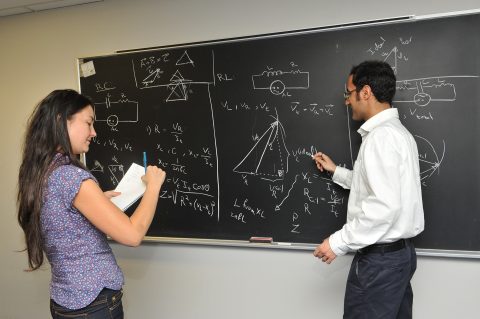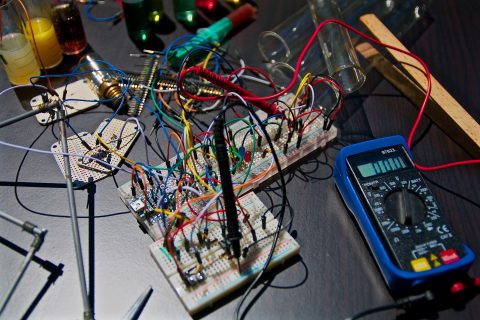Nanoscience and Nanotechnology
(MSc, MASc)
Program overview
The MSc/MASc in Nanoscience and Nanotechnology introduces students to a broad range of theories and hands-on skills needed to thrive in this cutting-edge, highly interdisciplinary field.
Nanoscience/nanotechnology examines the science and technological capabilities of materials and devices on the nanometer scale. Research and development in this area spans from the fundamental physical science of materials to biological and environmental implications, to technology development and device engineering. A few examples of topics include quantum materials, nanoconstructs for medical applications, chemical nanoengineering, nanomechanical systems, smart thin-films and biological circuits.
Working in interdisciplinary teams, students will develop a strong track record in research and walk away with marketable skills in the emerging advanced materials sector.
Program structure
Degree Requirements
Fully-qualified candidates are required to complete a minimum of 45 credits.
These requirements satisfy the general degree requirements for the Chemistry MSc and the Physics MSc and the Master of/Magistrate in Applied Science (MASc) offered by the Gina Cody School of Engineering and Computer Science.
Nanoscience and Nanotechnology MSc/MASc (45 credits)
| 6 | credits of Core Courses chosen from: These credits must be completed in the first year after entry. |
| 6 | credits minimum of Coursework, with two courses chosen from the Nanoscience Course List and the Nanotechnology Course List. Upon approval of the thesis advisory committee, one course may be replaced with an appropriate 600-level course from the student’s home department. |
| 33 | credits chosen from one of the following:
|
| If necessary and upon approval of the thesis advisory committee, the student will take additional courses to complete the program’s required minimum of 45 credits. |
Nanoscience Course List
Admission requirements
Admission Requirements
- Bachelor's degree with high academic standing in physics, chemistry, biochemistry or a related science discipline; or in engineering.
- Applicants are considered by the Nanoscience and Nanotechnology Admission Committee. Students must indicate through which of the participating departments they wish to have their application reviewed.
- The program is open to full-time students only.
- Proficiency in English. Applicants whose primary language is not English must demonstrate that their knowledge of English is sufficient to pursue graduate studies in their chosen field. Please refer to the English language proficiency page for further information on requirements and exemptions.
Application process
Application deadlines

FALL
Chemistry: June 1 (Canadian resident), February 1 (U.S. and international)
Physics: March 1 (all applicants)
Engineering: July 1 (Canadian resident), March 1 (U.S. and international)

WINTER
Engineering: November 1 (Canadian resident), July 1 (U.S. and international)

SUMMER
Engineering: March 1 (Canadian resident), November 1 (U.S. and international)
Priority will be given to complete applications submitted by the deadline. In some cases, programs may continue to accept applications as long as there is space available.
International students: Considering the waiting period involved in meeting the entry requirements to Canada and Quebec, we strongly encourage international applicants to apply early and submit supporting documents prior to the deadline.
Tuition & funding
Tuition and fees
Tuition and fees of the program may depend on your student status, among other key factors. Estimate these costs based on the most common situations.
Awards and funding
Funding packages are generally available for students in thesis-based programs. They come in the form of awards, teaching and research assistantships are offered at the time of admission to most students to allow them to focus on their research and studies. Research and thesis-based students are automatically considered for all entrance graduate awards when they apply to Concordia, provided they meet eligibility criteria. No separate application is required.
The Quebec and Canadian governments offer a number of competitive graduate scholarships. We encourage you to apply for these awards at the same time you are preparing your application.
Out-of-province students
Get $10,000 in special funding for thesis master's programs. Learn more
Other programs of interest

Access our specialized research centres and state-of-the-art facilities to experience the immediate impact of your research in numerous areas of chemistry.
Department
Department of Chemistry and Biochemistry
Faculty

Research under the supervision of faculty experts in fields such as bioengineering and chemistry in cutting-edge research centres which promote interdisciplinary collaborations in nano-, molecular and life sciences.
Department
Faculty

Conduct your electrical and computer engineering research in established research centres and laboratories for telecommunications, signal processing, systems controls and robotics, power systems and renewable energy.
Department
Department of Electrical and Computer Engineering
Faculty

